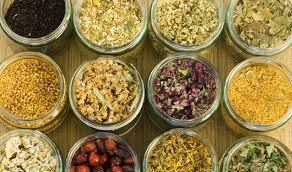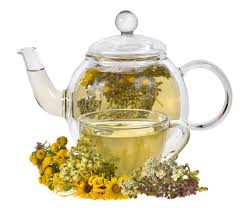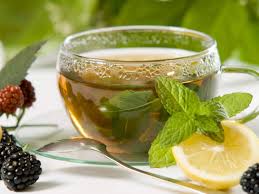|
Herbal teas are not tea at all. These beverages are called teas because they are made using the same method that is used for making tea: pouring hot water over a selection of plants. Because most herbal teas do not contain the caffeine that is present in tea, they can be a nice addition to Afternoon Tea for those who prefer non-caffeinated beverages.
Today, the number of herbal “teas” that are available is almost limitless. Popular varieties include ginger, cranberry, lemon, peppermint, rose hip, chamomile, chrysanthemum, and an infinite variety of combinations of herbs and spices. Many people like to make their own herbal teas from the plants, flowers and herbs growing in their gardens. When planning to host an Afternoon Tea, it is always thoughtful to include at least one herbal beverage. And the season of the year, as always, is our best guide in selecting the herbal teas that will complement the foods we plan to serve. A tisane, the French word for herbal tea, is also a beverage made from the infusion of hot water with herbs, plants or spices. Some people like to make a distinction between the two by emphasizing the fact that a tisane is drunk primarily for medicinal purposes. Many tisanes, such as chamomile tea and ginsing, have a pleasant flavor and go well with food in addition to providing mild health benefits. Thus, tisanes can also be invited to Afternoon Tea. |
- Home
- About/Blog
-
The Tea Book
- The Road Back to Civilization
- A Brief History of Tea
- Philosophy of Tea >
- Guidelines for the Host/Hostess >
- Guidelines for the Guest >
- A Checklist for Planning a Tea Party
- Teas of the World and How to Make Tea >
- Tea Utensils and Accessories >
- Tea Menu Basics >
- Afternoon Tea and the Four Seasons >
-
A Calendar of Tea Parties
>
- January: A Japanese New Year’s Tea
- February: A Valentine’s Day Tea
- March: A St. Patrick’s Day Irish Tea
- April: An Easter Tea
- May: A Mother’s Day Tea
- June: A Wedding Reception Tea >
- July: A Picnic Tea
- August: A Family Reunion Tea >
- September: An Ozark Farm Harvest Tea
- October: A Tea to Honor Our Ancestors (Dia de los Muertos)
- November: A Post Thanksgiving Tea
- December: A Christmas Tea >
- A World of Tea Parties >
- Afternoon Tea for Special Occasions >
- Purchase Recipes
- Resources



